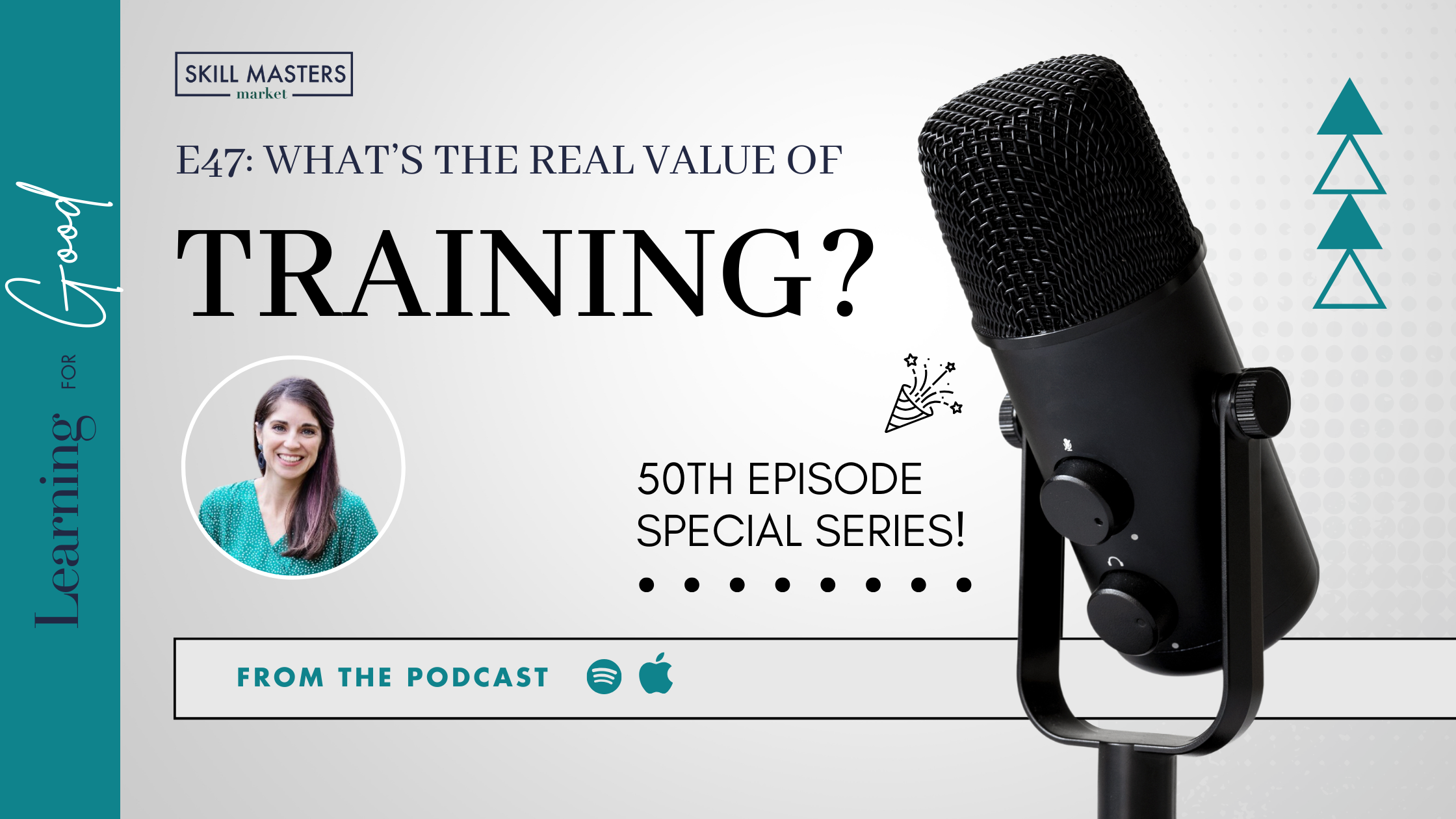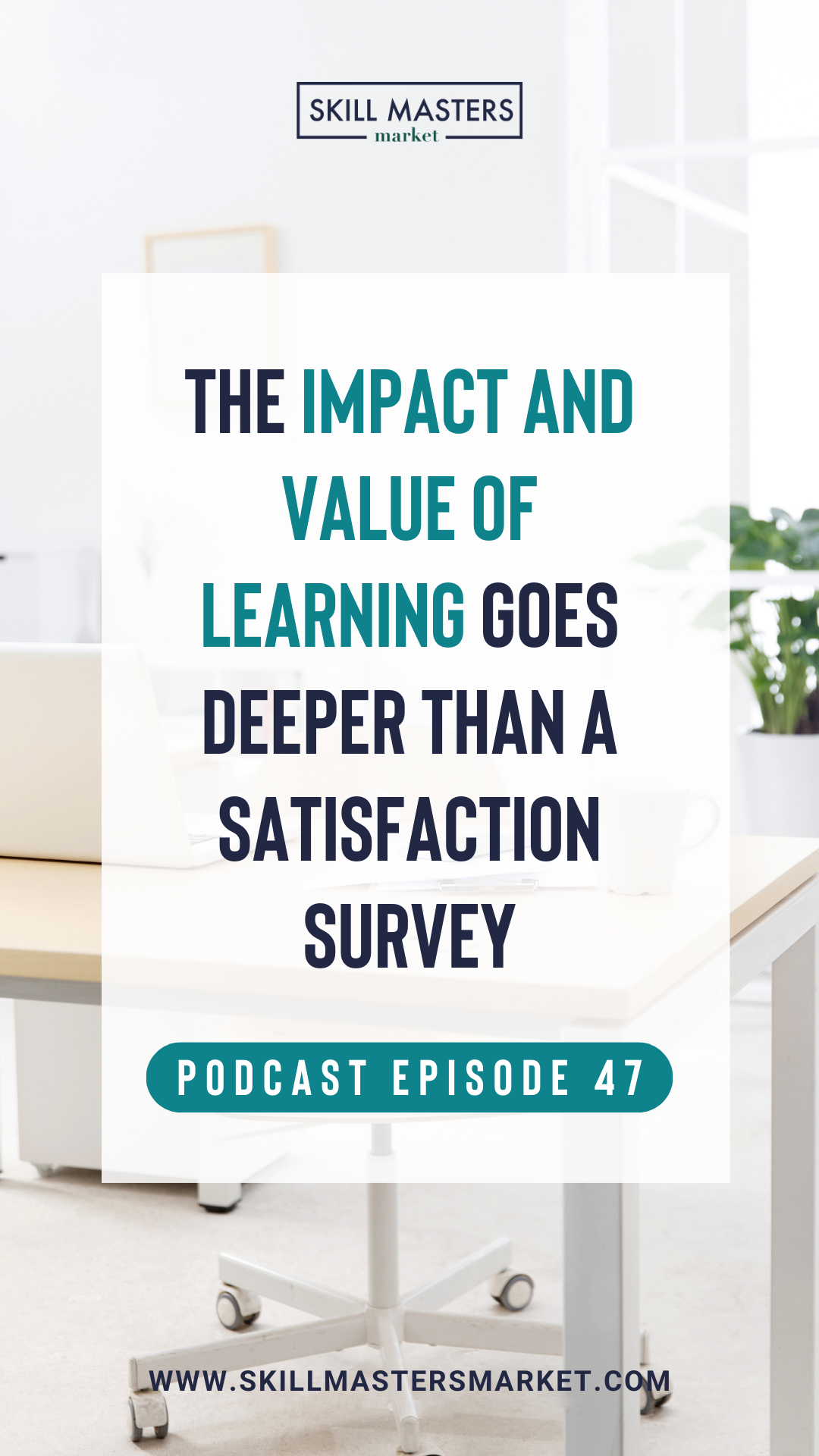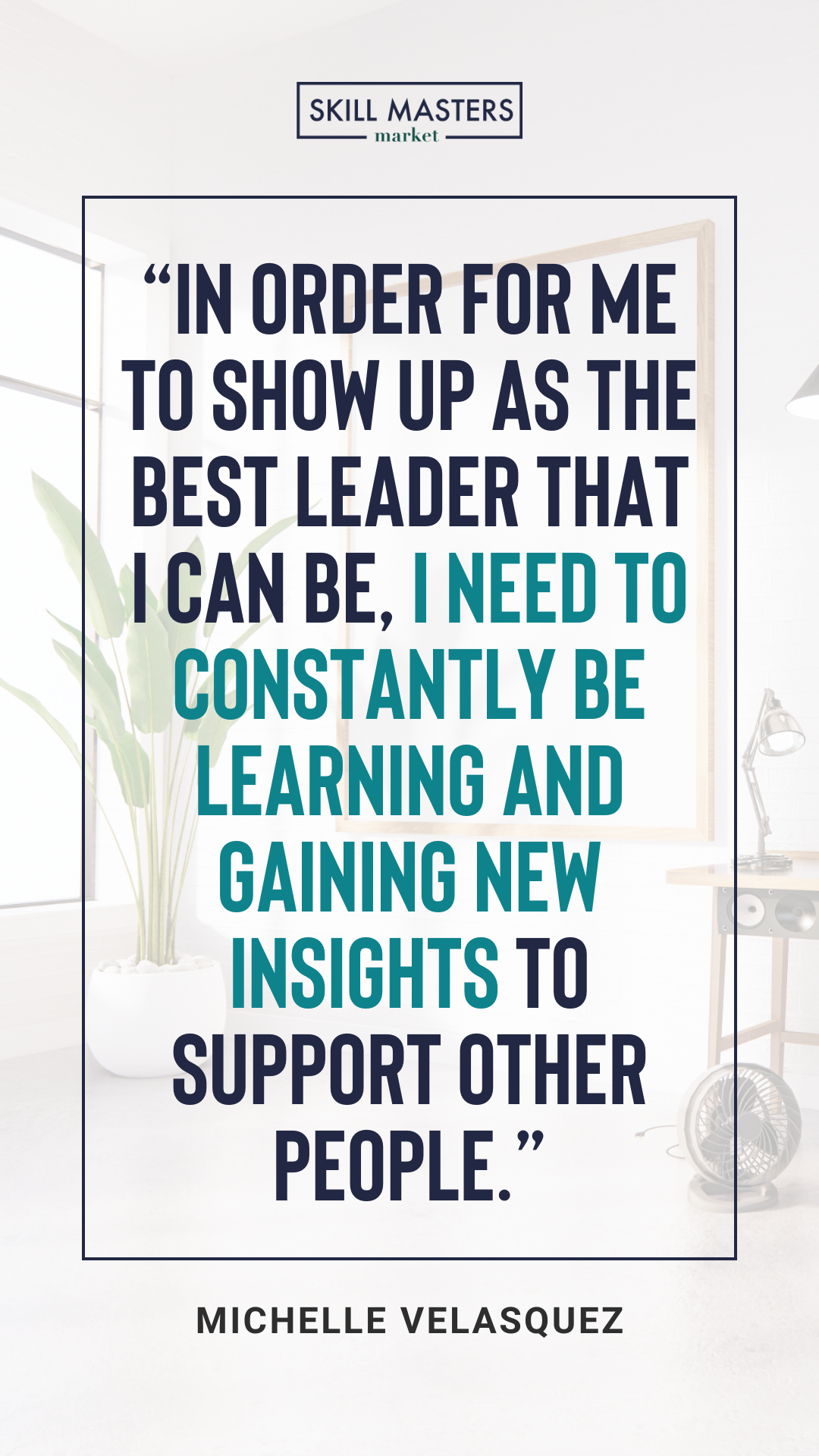What is the Real Value of Training?
As Learning and Development leaders, we spend so much of our time thinking about training.
Who needs training? What do they need? How will it benefit them? How will it benefit the organization? What is the value and ROI?
Today, I want to explore the qualitative impact of training. That's why I'm bringing the stories of impact from across my network. These are stories that were shared with me by previous guests and listeners just like you and I'm so honored to share them with you here today.
Listen to the episode or scroll down to read the blog post ↓
Key Points:
05:43 Getting out of your comfort zone with Danielle Gines
07:08 Not making assumptions with Tim Lockie
09:34 Focusing on a growth mindset with Michelle Velasquez
12:21 The value of coaches with Marnie Van Wyk
14:06 The impact of training on leadership with Kay Meredith
15:38 Applying learning with Alanna Hughes
17:35 Never stop learning with Sonya Perez-Lauterbach
Click here to listen on Apple Podcasts. While you're there, subscribe to be the first to know about new episodes!
What is the Real Value of Training?
As learning and development leaders, we spend so much of our time thinking about training.
Who needs training? What do they need? How will it benefit them? How will it benefit the organization?
We are often questioned on the value of training.
What is the return on investment?
Our response is often to produce satisfaction surveys showing that people liked the training that they went to, or net promoter scores to show that people would recommend the training to their peers.
These aren't bad metrics, but they aren't the only metrics. While we could and will do an entire episode on measuring learning impact, I want to explore the qualitative data and the qualitative impact of training today.
You probably have a personal story of how training impacted you. It might even be why you're in the field today. You may occasionally hear the stories of impact from your learners. These moments are the moments we live for, the moments we know we are successful, the moments we know our work is meaningful.
That’s why on episode 47 of the podcast, I'm bringing the stories of impact from across my network. These are stories that were shared with me by previous guests and listeners just like you and I'm so honored to share them with you.
In this blog post, we’re covering the following:
1) Getting Out of Your Comfort Zone with Danielle Gines
Danielle Gines of DG Consultancy shares an example of doing the unexpected, and how valuable that was for one particular audience.
When thinking about the value and impact of training, Danielle goes back to this one session she did for a community college.
“I decided to do a language shock activity which is kind of bold and at times risky, because you start speaking a language no one else in the room can comprehend or is familiar with.” - Danielle Gines
Danielle explains that you ask the learners to introduce themselves, and because they don't understand, there's some level of confusion. It only lasts a couple of minutes until, through gestures, something clicks. After which Danielle switched back to the teaching language.
“We talked about how the activity connects to the topic, which was working with international students and multi-lingual students, and how to do it in an empathetic way so that it's an inclusive experience throughout the college. And to this day, everyone still talks about that session.” - Danielle Gines
The training fostered some open and thoughtful conversations, and so when it comes to valuable training, Danielle highlights that it is important to know that we might get out of our comfort zone, but it has a deep and sustainable impact when we do.
2) Not making Assumptions with Tim Lockie
Speaking of the unexpected, all of my favorite life and leadership lessons are from my kids. It's in parenting that I learned most of my lessons. So I was excited to hear Tim Lockie's story about his son and how he saw the value of training through an experience they had.
Tim explains how when his son was less than four years old, he found a paper bag and put it on his head. After Tim caught him, he told him that we don’t run around with bags on our heads.
“He looked at me and there's this recognition of like, oh, okay, that makes sense. We don't do that. And then he never ran around with bags on after that.” - Tim Lockie
Tim goes on to explain that there are so many times when he has been like that and has needed someone to come along and tell him that there’s another way to do something or there are some other things to consider.
“I appreciate people who don't assume that I know to not run around with a bag on my head. So don't assume people know.” - Tim Lockie
I love this. We can't assume.
Training is valuable because it forces us not to just assume that the learners know something, but to spend the time, effort, and energy supporting them so they can do things differently in the future. We can take the bag off their head, so to speak so that they can see what is in front of them.
They're set up for success time and time again.
3) Focusing on a Growth Mindset with Michelle Velasquez
Michelle Velasquez is an incredible nonprofit leader who spends her time inside and outside of work, investing in others and helping them grow in their leadership.
To Michelle, leadership is the greatest responsibility.
“The impact that training has had on my life is possibility, it’s access, it’s having the opportunity to learn something new from somebody else. It's having opportunities to get really uncomfortable over a topic that perhaps I didn't even know would make me uncomfortable. Training has given me the opportunity to see things differently, to have a growth mindset, and to stay curious.” - Michelle Velasquez
Michelle can walk away from trainings with nuggets of information, that she is then able to share with others to help them grow.
“In order for me to show up as the best leader that I can be, I need to constantly be learning and gaining new insights to support other people.” - Michelle Velasquez
I love Michelle's focus on the growth mindset, allowing her to learn new things and be a stronger, better leader. But I also love that she mentioned being able to pass that learning on to others.
“The ripple effect of training isn't often talked about. But when we invest in our staff, customers, or members, depending on the type of nonprofit and your audience for training, it can have an impact for years to come.” - Heather Burright
4) The value of coaches with Marnie Van Wyk
Marnie Van Wyk's career has spanned education, nonprofit, and consulting. She shares how coaches helped her frame and reframe situations so she can make the best decisions.
I'm a big fan of coaching as a wraparound support to training for this reason. Coaching can prepare learners to apply what they've learned, reflect on how it went, and then find new learning in the process.
“Both my mom and my grandma were teachers. And your first trainer, I think, is a parent. And for me, one thing I appreciated about my mother as a trainer / mother, is that she was always very clear with her communications and her delivery. And the expectations were always very clear.” - Marnie Van Wyk
Marnie also emphasizes her mother’s creativity.
“Another thing I appreciated about her as a trainer is her creativity. So anytime there was a new task to learn, it was always fun. And there was something interesting that she incorporated into it, whether it was a challenge or a competition with my sisters.” - Marnie Van Wyk
Marnie says she has had the privilege of having some great mentors and coaches.
“One thing that they have helped me with is framing my experiences as a leader, basically, having a growth mindset. And…when I was thinking about decisions that I had made that perhaps I was looking back on and regretting rather than regretting those decisions, reframing that process and seeing it as, I made the best decision with the information I had at that point in time.” - Marnie Van Wyk
5) The impact of training on leadership with Kay Meredith
We often talk about training related to functional skills or leadership skills, helping staff do their jobs better. Kay Meredith talks about how training has impacted her leadership style and how she shows up as a leader.
Kay is a nonprofit Learning and Development leader and has also been a guest on this show in the past.
“Training has played a valuable role in my leadership journey, especially when I think about those training or learning experiences that are about identity and racism, as well as those that are about building relationships with others.” - Kay Meredith
Kay thinks that those two types of training probably influenced her leadership style the most, and just overall have helped her to be more self-aware and confident.
So not only does training impact people for years to come, but it also impacts us in ways we don't anticipate.
If you want to listen to the episode I did with Kay, tune into episode 03: What One Nonprofit Did to Kickstart Their DEI Training Initiative with Kay Meredith.
6) Applying learning with Alanna Hughes
I love this next example because it's so in line with my approach to training.
Alanna Hughes, co-founder of Withinnovate, and a former guest of the show shares how training allows you to combine what you know, with what others know.
As adult learners, we all bring experiences and expertise to the learning experience. So we have an exciting opportunity to leverage that and build on that.
Alanna explains how she experienced training through a unique lens early in her career as a Peace Corps volunteer in the Dominican Republic. A large part of her work was focused on local capacity building.
This showed her just how much we, as humans, can absorb and replicate new abilities.
“It also taught me how expert can be a relative term and how important it is to combine what you know, with what others you partner with know. And then ultimately, as well, the skills themselves that you're learning are not as important as how they're then applied to the work to have an impact.” - Alanna Hughes
Alanna continues to reflect on these things 15 years later. It has also made her a huge advocate for training and talent development for early career professionals.
Another key element of what Alanna shared is the opportunity to apply the learning. This is a powerhouse combination, bringing your current experiences and expertise, building on them, and then applying what you're learning. This sets the learner up for true behavior change.
To listen to the episode I had with Alanna tune into episode 42: 3 Reasons to Use Intrapreneurship to Build Skills In Your Nonprofit's Early Career Staff with Emily Glasgow and Alanna Hughes.
7) Never stop learning with Sonya Perez-Lauterbach
The final nugget of wisdom came from Sonya Perez-Lauterbach.
Sonya explained how when she was working at a nonprofit, dealing with a lot of organizational change, she visited a friend's class within her master's program around organizational change.
In that class, the talk about team dynamics and team building was so profound that Sonya had to apply to the program. The program was actually in learning and organizational change.
“I went for the organizational change information. I wanted to know how to lead organizations better through transition. And it was the learning that truly was instrumental in my understanding of leadership. And for some reason, I had thought about learning within a school context and not within the work context. And when I realized that every job needs to have a training element in it, whether you're learning how to regulate your emotions, navigate conflict, how to do email, better communication, all of those things. We need to be growing professionals always in the process of training and improving our skill set.” - Sonya Perez-Lauterbach
Never stop learning.
That's Sonya’s key message. As a leadership coach, I would expect no less. And I love it. I am here for it.
To hear the full conversation I had on the Learning for Good Podcast, scroll all the way up and tune into episode 47.
The Nonprofit Learning and Development Collective
Do you wish you could connect with other nonprofit learning and development leaders?
I know what it feels like to want someone to bounce ideas off of and to learn from, someone who really understands you and your work. Imagine if you could have a simple way to meet people in the field, ask questions, and share information.
That's why I created the Nonprofit Learning and Development Collective – so nonprofit L&D, talent management, and DEI leaders can connect with each other quickly and easily in a virtual space.
When you join this community, you will walk away with a new, diverse, and powerful network – and a sounding board for your staff development needs.
So if you're ready to exchange ideas and collaborate with your peers, come join the Nonprofit L&D Collective.




